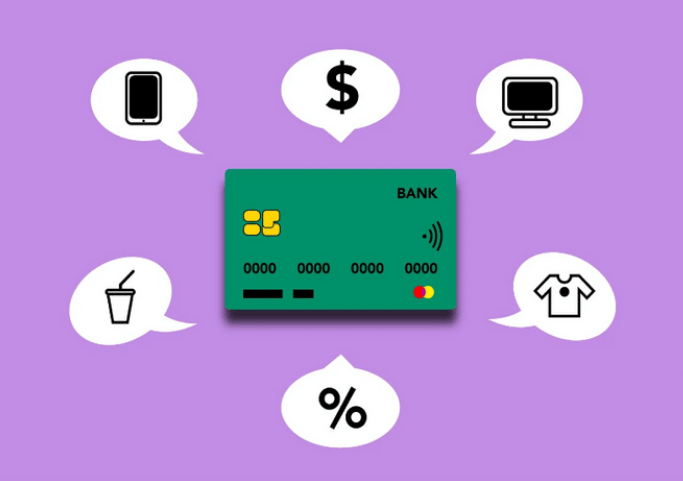What is a Credit card? A credit card is a thin rectangular piece of plastic or metal issued by a bank or financial services company.
A credit card allows you to issue a credit limit that is provided by your credit card issuer. Your credit limit is the maximum amount you can borrow.
Instead of giving you a full loan in cash. The card issuer allows you to take the credit limit in a fixed time. As soon as you borrow, you can borrow again.
In addition, credit cards impose the condition that cardholders repay the borrowed money. Plus any applicable interest, as well as any additional agreed-upon fees, either with the billing date or time.
You can also apply for credit cards online. A major advantage of using these instant credit cards is that you will have to pay monthly bills on a fixed date later every month.
It comes in the form of a plastic card that is swiped at the point of sale terminals placed at a merchant establishment (such as a shopkeeper) or used to make digital payments.
Many banks also provide instant Credit cards to their valued customers without any credit cards charges. Generally, they do not require any fees or annual fees.
READ ALSO : Education Loan Interest Rates In India
How Do Credit Card Work?
To shop at a brick-and-mortar retailer, you usually insert the credit card into the card reader so that it can read the security chip on the card.
You may also ask to enter your billing zip code. From an online retailer, you will ask to enter the card number, expiration date, security code (usually found on the back of the card), and your name and billing address.
In addition, When you swipe your credit card to make a purchase. The merchant’s credit card terminal asks your credit card issuer if the card is valid and has sufficient credit available.
Your credit card issuer then sends a message saying whether the transaction approved or rejected. If it approved, you are good to go. If not, you may have hit your credit card limit or your card has become inactive due to suspected fraudulent activity.
However, It not necessary that your identity has been stolen; Credit card issuers can deactivate your card and contact you if you have made an unusual purchase.
For example, if you travel abroad, your card issuer may deactivate your card until it confirms that you are the one who made the purchase.
Credit Card Comparison of All Banks in India
| Credit Card | Interest Charge Per Month | Joining Fee |
|---|---|---|
| ICICI Bank | 1.99% to 3.50% | Nil to ₹ 1,25,000 |
| SBI | 2.50% to 3.50% | Nil to ₹ 4,999 |
| HDFC Bank | 1.99% to 3.60% | Nil to ₹ 10,000 |
| Axis Bank | 2.50% to 3.40% | Nil to ₹ 10,000 |
| Citibank | 2.50% to 3.25% | Nil to ₹ 20,000 |
| Standard Chartered Bank | 3.49% to 3.49% | Nil to ₹ 499 |
| HSBC Bank | 2.49% to 3.35% | Nil to ₹ 3,499 |
Types of Credit card Networks
There are four primary companies that act as credit card networks for payment processing:
- Visa: This is a payment network only; Namely, it does not issue credit cards directly to consumers, although you will see the Visa logo appearing on multiple cards to identify their association with the card’s payment network. Visa also oversees the Visa Signature benefits associated with certain credit cards, such as premium rental car privileges and hotel allowances.
- Mastercard: Again, this is only a credit card network. But it has its own suite of card protection and benefits, such as identity theft protection and extended warranties.
- American Express: American Express is a credit card network and card issuer that both issues credit cards and processes payments for cards that affect its logo. It also provides cardholder benefits such as travel insurance.
- Discover: It is both a card network and a card issuer that offers benefits such as secondary rental car collision insurance.
READ ALSO : Best Student Loans For International Students
Credit card Benefits
- Recurring Payments: You can use a credit card to set up recurring payments of your electricity bill, phone bill, etc.
- Free Credit: Each Credit cards has a grace period of 40-50 days. Therefore, if you make a purchase and repay it in full within the grace period, no interest will be charged. However, once the interest rate is levied on your bill, the grace period will no longer apply.
- Credit Score: Many people do not know, but credit cards are the best way to improve your credit score or create a credit history for yourself.
- Convenience: It is no longer possible to carry cash everywhere, nor is it completely safe. However, you can easily carry a small plastic card with you anytime you go and make a transaction with a simple card swipe.
- Cashback and Discount: Offers a host of benefits, cashback, and discount deals on credit cards, store shopping, fuel, online shopping, food, travel, and more.
- Rewards: Every time you use credit cards, you accumulate some reward points depending on the card and the bank. You have the option to cash in on these points to receive gifts and vouchers.
READ ALSO : Best Business Loan Interest Rates in India
Important Credit cards Details
- To build your credit score: Disciplined swiping of credit cards can help improve your credit score. The reason for this is that companies issuing instant credit cards will report your payment activity to the credit bureaus. In addition, an important credit cards statement is that if you make full payment within the grace period, interest is charged on your purchase.
- To avail of instant loans: An important piece of credit cards information is that if you have a good credit score, you can get a loan for your card. You also have the option of converting your purchases to credit cards EMIs that can be paid off during the pre-agreed loan period.
- To earn cashback and reward points: Other credit cards that you can avail of are attractive reward points and cashback. These cashback and discounts reduce shopping costs. On the other hand, reward points can be redeemed from the partner for goods or services. Store.
- To save money on grocery shopping: For many people, grocery shopping is a regular task, and therefore, no other option comes to our mind than using these cards. Most of the cards have been affiliated with supermarkets, meaning you can earn something. Extra cashback or discount on your daily purchases. The more you spend, the more you get a discount through these cards.
- To cut the cost of existing debts: The main advantage of using them is that it helps you get out of the vicious cycle of debt which only worsens over time due to compound interest rates.
- To track your expenses: Credit cards help you keep track of your day-to-day expenses. Your statements include the name of the merchant, the date of the transaction, and the amount spent. Some cards offer a year-end summary as well which helps when paying taxes.
Top Credit cards in India
| Card Name | Category | Annual Fee | Joining Fee | Late Payment Fee |
|---|---|---|---|---|
| Jet Privilege Diners Card | Lifestyle | 10,000 | 10,000 | 750 |
| Emeralde Credit Card | Lifestyle | 12,000 | 12,000 | 0 |
| Jet Privilege HDFC Bank World Card | Travel and Airline | 2,500 | 2,500 | 750 |
| Infinia Card | Lifestyle | 10,000 | 10,000 | 750 |
| Diners Club Black Card | The Lifestyle | 10,000 | 10,000 | 750 |
| Instant Platinum Card | Low Fee | 99 | 199 | 750 |
| Premier Master Card | The Low Fee | 0 | 0 | 750 |
| Insta Easy Card | Low Fee | 0 | 0 | 700 |
| PremierMiles Card | Travel and Airline | 3,000 | 0 | 100 |
| Rewards Card | Shopping | 1,000 | 1,000 | 1,300 |
Credit Cards Eligibility
Credit cards eligibility varies depending on the bank’s internal credit policies and the purpose for which the card is availed. Some basic eligibility criteria include:
- Applicant should be at least 18 years of age
- The Applicant should have a regular source of income either through salary, self-employment, or own business
- Applicant should have a savings account in his/ her name
- Applicant should have a good credit score or CIBIL Score
READ ALSO : Best Bike Loan Interest Rate in India
READ ALSO : Best Gold Loan Interest Rates In India








